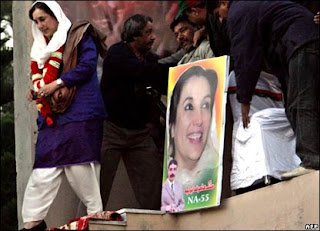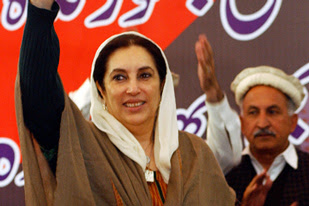Straits Times, Oct 6, 2007
Suspend Myanmar from Asean
By Barry Desker, For The Straits Times
LAST week’s crisis in Myanmar makes it imperative that Asean move beyond statements to action.
The 1997 Asean decision to admit Myanmar under the current military leadership without any conditionality was a mistake. Myanmar took shelter under Asean’s wings but there was no commitment by the junta to open up the economy or restore its fledgling democracy. Frankly, Myanmar has been an albatross around Asean’s neck for the past decade.
Asean broke new ground on Sept 27 when the Asean foreign ministers agreed to a statement by the current Asean chair, Singapore’s Minister for Foreign Affairs George Yeo, stating that they were appalled to receive reports of automatic weapons being used to quell the demonstrations in Myanmar and demanded that the Myanmar government immediately desist from the use of violence against demonstrators. They strongly urged Myanmar to seek a political solution and to work towards a peaceful transition to democracy, and called for the release of all political detainees, including Daw Aung San Suu Kyi.
The Asean ministers recognised that what the junta has done is unacceptable. Asean should now go further. It is time that Myanmar was suspended from the privilege of Asean membership.
As Asean’s leaders will be adopting the Asean Charter to give the organisation a legal personality when they meet in Singapore on Nov 18, Asean needs to adopt clear standards of behaviour for its members.
Key provisions of the Charter will call for the promotion of democracy, human rights and obligations, transparency and good governance and strengthening of democratic institutions. But Asean needs to agree on what it will do if a member blatantly flouts these conventions.
Previously, it had adopted the practice of raising its discomfort with developments in Myanmar privately at meetings with Myanmar leaders and at informal retreats of Asean ministers, where no official records were kept.
Since its founding, Asean’s formal position was that every member had the right to lead its existence free from external interference, subversion or coercion. This principle of non-interference and non-intervention in the internal affairs of one another helped each state to develop its own identity in the first years of the grouping’s existence.
The primary concern of each member from 1967 was that it should be allowed to forge its own post-colonial identity.
Memories of Indonesia’s Konfrontasi policy towards Malaysia and hostility to post-independence Singapore, the bitter Singapore separation from Malaysia, the Philippines’ claim to Sabah and Thai fears of spillover from the conflicts in Indochina shaped Asean’s handling of domestic developments in the region. An emphasis on developing mutual confidence, understanding the different perspectives of each member and creating an awareness of the regional environment and regional sensitivities marked interactions in the early years.
In 1967, Asean leaders were more attuned to the political environment of the former metropolitan countries and needed to become familiar with their neighbours.
This process of developing cohesion and the habit of cooperation received a boost from the challenge posed by the Vietnamese invasion and occupation of Cambodia in December 1978. Asean’s resolute response to the invasion and ability to build an international coalition opposed to the intervention marked a high point for the policy of non-interference. It meant supporting the genocidal Khmer Rouge regime in Cambodia but it also led to international credibility and recognition for Asean as the only Third World regional grouping able to influence United Nations debates and shape the conflict negotiation process.
In 1967, a policy of non-interference and non-intervention also made sense to the post-colonial regimes in Southeast Asia as they were faced with domestic insurgencies by communist revolutionary movements assisted by China.
As the Asean states sought improved ties with China after the historic Nixon visit to China in 1971, calls for an end to Chinese support for the communist parties in the region were coupled with the need to uphold the principles of non- interference and respect for the sovereignty of the region’s states.
Forty years later, geopolitical realities have changed. The end of the Cold War undermined the logic of the policy of non-intervention and non-interference. Doctrines of humanitarian intervention and ‘the responsibility to protect’ are increasingly the basis of decision-making in the UN Security Council, especially as the impact of bloodshed and the consequences of riots, revolutions and bombings are covered hour by hour on television screens and in widely circulated blogs and on the Internet.
In 1988, the scale of the much larger crackdown by the Myanmar military only became known several weeks later. Today, these images are transmitted instantaneously around the world by mobile phones and YouTube.
As long as Myanmar is part of the highest councils of Asean, the region will have a credibility problem when it seeks to address issues of humanitarian concern elsewhere around the globe.
Not only is the junta a failure when it comes to ensuring Myanmar’s economic development, it has also failed to build a cohesive society or ensure a political transition from military rule.
Myanmar does not play an effective role within Asean either. When former Malaysian prime minister Mahathir Mohamad succeeded in getting Asean approval for Myanmar’s admission in 1997, it was believed that Myanmar’s participation would lead to learning by example: As Myanmar interacted with Asean states, it would realise that outward-looking policies, increased foreign investment and expanded trade, tourism and other exchanges would lead it to move in the direction of a more open society increasingly integrated with the rest of South-east Asia. These hopes were soon dashed.
As the Singapore co-chair of the Singapore/Myanmar senior officials working group on economic issues, I realised in 1998 that we were going nowhere. As we were preoccupied with the Asian financial and economic crisis, we decided not to proceed with these meetings as our hosts were more interested in taking us on a week-long jaunt to gem mines and tourist attractions than engaging in serious exchanges on policy issues.
As Asean moves towards the establishment of an Asean Community based on the three pillars of a Security Community, a Socio-Cultural Community and an Economic Community, can it afford to have a member seen as having a government that has failed to ensure the well-being of its people not just recently but since it joined Asean?
Old Asean hands will say that Myanmar is part of Asean and should be a member. Yes, but only when Myanmar can uphold its commitments. Until then, the forthcoming Asean Summit should agree on the suspension of Myanmar’s membership.
The writer is Dean of the S. Rajaratnam School of International Studies, Nanyang Technological University.
In addition, MM Lee Kuan Yew was quoted in the Straits Times (to appear on 10 Oct) describing Myanmar’s ruling generals “as being rather ‘dumb’ when it comes to managing the country’s economy” and “will not be able to survive indefinitely”.
Already, several months ago, the Singapore Government decided it would not defend Myanmar at the UN any more because of its refusal to show any meaningful progress on its “Roadmap to Democracy”. Now, such strident calls from a “non-government academic” could be a prelude to an even more significant shift in Singapore’s public position on Myanmar.
There is no better time to ratchet up the pressure as now. If Singapore and ASEAN miss this window of opportunity to pressure the generals to compromise, we could be looking at another 20 years of brutal military suppression and economic disasters before the next uprising.


As a former MFA officer (writing in my personal capacity), I’m cautiously supportive of pragmatic foreign policy. Yes we should do what works. But pragmatism has been used to support every policy made by our Govt — moral or not, working or not. “Pragmatism” led us to admit Myanmar to Asean. “Pragmatism” guided our failed policy of constructive engagement of the military junta.
Yes, I support a rational and pragmatic foreign policy. I also support foreign policy that works. Our Myanmar policy has not worked. Therefore the pragmatic response would be to change that policy.